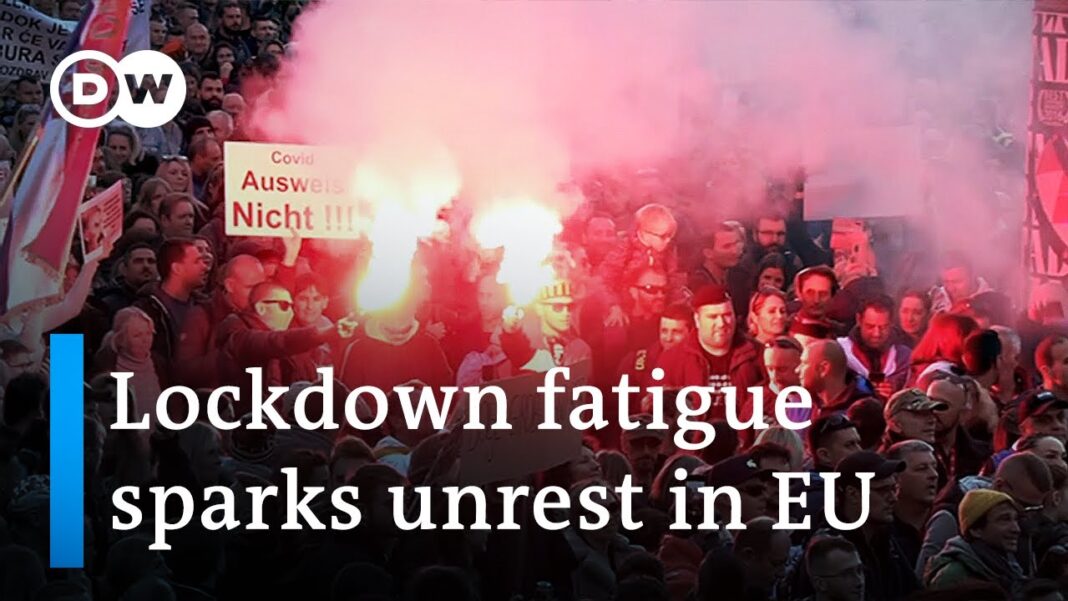Major economies in Europe have started to roll back COVID-19 restrictions that were implemented in recent weeks in response to a spike in cases and hospitalizations.
In the United Kingdom, people won’t have to wear masks in public or show proof they’ve been vaccinated to enter some venues like restaurants or pubs starting next Thursday.
“Because of the extraordinary booster campaign, together with the way the public have responded to the Plan B measures, we can return to Plan A in England and allow Plan B regulations to expire as a result from the start of Thursday next week,” Prime Minister Boris Johnson said several days ago.
The prime minister cited data suggesting the Omicron variant surge has “now peaked nationally.”
“And having looked at the data carefully, the Cabinet concluded that once regulations lapse, the government will no longer mandate the wearing of face masks anywhere,” Johnson also said.
In nearby Ireland, nearly all COVID-19 rules are expected to expire on Saturday morning, including capacity limits for outdoor and indoor events. Early closing times and some so-called social distancing measures have also been done away with, officials said last week.
“The main thing our government has to consider in our meeting today is issues around the timing as well as issues around financial support for businesses. As we’ve always said there won’t be a cliff edge for the removal of passports for business, but there will be an end,” said Ireland’s deputy head of government, Leo Varadkar, in public remarks.
French Prime Minister Jean Castex late last week said the country will start to roll back restrictions in the coming weeks, asserting that France’s COVID-19 case numbers and hospitalizations have improved.
“This exceptional wave is not over, but the situation is starting to evolve more favorably,” Castex remarked on Thursday. However, he tied the easing of restrictions with France’s new COVID-19 vaccine passport that comes into effect on Monday, and which some critics have described as draconian and has drawn mass protests in recent days.
Castex and other French officials said that the vaccine passport system may be done away with entirely if the COVID-19 situation in the country further improves. Health Minister Oliver Veran said Thursday it would depend on how many people are hospitalized.
“We are a bit more confident in saying we can relax some of these constraints and let people return to life as normal as possible,” Veran said, according to France24.
Outdoor mask mandates, audience capacity limits at some venues, and working from home won’t be required on Feb. 2, French officials said. Nightclubs will also be permitted to reopen in mid-February.
On Jan. 20, Spain’s prime minister, Pedro Sanchez, told reporters that the European Union should approach COVID-19 in the same manner that it approaches influenza, as frequent studies and data have shown the Omicron variant is far less virulent than previous variants.
“What we are saying is that in the next few months and years, we are going to have to think, without hesitancy and according to what science tells us, how to manage the pandemic with different parameters,” he said Monday, reported The Associated Press.
Meanwhile, Germany and Austria appear to still be forging ahead with plans to make COVID-19 vaccines mandatory for everyone who is eligible in the coming weeks. Austrian rules stipulate massive fines worth thousands of euros and other penalties for those who refuse to comply.
But the nearby Czech Republic has abandoned plans to make the shot compulsory following widespread protests in Prague and other cities, according to the office of new Prime Minister Petr Fiala.
“We’ve agreed that vaccination against COVID-19 won’t be mandatory,” Fiala said during remarks last week. “This does not change our stance on vaccination. It is still undoubtedly the best way to fight COVID-19 … however, we do not want to deepen fissures in society.”







